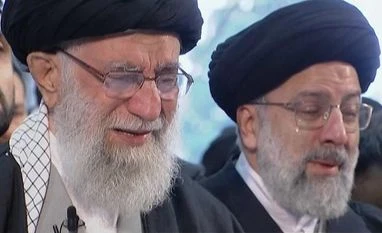Weeping amid wails from a crowd of hundreds of thousands of mourners, Iran's supreme leader on Monday prayed over the remains of a top Iranian general killed in a US airstrike in Baghdad, an attack that's drastically raised tensions between Tehran and Washington.
The assault killing Iranian Revolutionary Guard Gen. Qassem Soleimani already has seen his replacement vow to take revenge as Tehran has abandoned the remaining limits of its 2015 nuclear deal with world powers in response to the slaying. Separately, Iraq's parliament has called for the expulsion of all American troops from Iraqi soil.
The three developments could bring Iran closer to building an atomic bomb, set off a proxy or military attack launched by Tehran against America and enable the Islamic State group to stage a comeback in Iraq, making the Middle East a far more dangerous and unstable place.
Adding to the tensions, President Donald Trump threatened to demand billions of dollars in compensation from Iraq or impose sanctions like they've never seen before if it goes through with expelling US troops. Soleimani's daughter, Zeinab, directly threatened an attack on the U.S. military in the Mideast while speaking to a crowd of hundreds of thousands in Tehran that stretched as far as the eye could see.
The families of U.S. soldiers in the Middle East will spend their days waiting for death of their children," she said to cheers. Iran's Supreme Leader Ayatollah Ali Khamenei himself prayed over the caskets of Soleimani and others slain in the attack.
Khamenei, who had a close relationship with Soleimani, Khamenei wept at one point during the traditional Muslim prayers for the dead. The crowd and others wailed.
More From This Section
Ghaani stood near Khamenei's side, as did Iranian President Hassan Rouhani and other top leaders in the Islamic Republic.
While Iran recently faced nationwide protests over government-set gasoline prices that reportedly killed over 300 people, Soleimani's mass processionals has seen politicians and leaders across the Islamic Republic's political spectrum take part, temporarily silencing that anger.
Ghaani meanwhile made his threat in an interview with Iranian state television aired Monday. "God the almighty has promised to get his revenge, and God is the main avenger. Certainly actions will be taken," he said.
Ghaani now serves as the head of the Revolutionary Guard's Quds Force, an expeditionary arm of the paramilitary organization answerable only to Khamenei.
As Soleimani's longtime deputy, Ghaani has been sanctioned by the U.S. since 2012 for his work funding its operations around the world, including its work with proxies in Iraq, Lebanon and Yemen. Those proxies likely will be involved in any operation targeting U.S. interests in the Mideast or elsewhere in the world. Already, the U.S. Embassy in Saudi Arabia warned Americans of the heightened risk of missile and drone attacks.
In Lebanon, the leader of the Iranian-backed militant group Hezbollah said Soleimani's killing made U.S. military bases, warships and service members across the region fair game for attacks. A former Iranian Revolutionary Guard leader suggested the Israeli city of Haifa and others could be targeted should the U.S. attack Iran.
"We promise to continue down martyr Soleimani's path as firmly as before with help of God, and in return for his martyrdom we aim to get rid of America from the region," Ghaani said.
On the nuclear deal, Iranian state television cited Sunday a statement by President Hassan Rouhani's administration saying the country would not observe the nuclear deal's restrictions on fuel enrichment, on the size of its enriched uranium stockpile and on its research and development activities.
The Islamic Republic of Iran no longer faces any limitations in operations, a state TV broadcaster said.
German Chancellor Angela Merkel, French President Emmanuel Macron and British Prime Minister Boris Johnson specifically urged Iran to withdraw all measures not in line with the 2015 agreement that was intended to stop Tehran from pursuing its atomic weapons program.
Iran insisted that it remains open to negotiations with European partners over its nuclear program. And it did not back off from earlier promises that it wouldn't seek a nuclear weapon.
However, the announcement represents the clearest nuclear proliferation threat yet made by Iran since Trump unilaterally withdrew from the accord in 2018 and reimposed sanctions.
It further raises regional tensions, as Iran's longtime foe Israel has promised never to allow Iran to produce an atomic bomb.
Iran did not elaborate on what levels it would immediately reach in its program.Tehran has already broken some of the deal's limits as part of a step-by-step pressure campaign to get sanctions relief. It already has increased its production, begun enriching uranium to 5% and restarted enrichment at an underground facility.
While it does not possess uranium enriched to weapons-grade levels of 90%, any push forward narrows the estimated one-year breakout time needed for it to have enough material to build a nuclear weapon if it chose to do so.
The International Atomic Energy Agency, the United Nations watchdog observing Iran's program, did not respond to a request for comment.
However, Iran said that its cooperation with the IAEA will continue as before.
Foreign Ministry spokesman Abbas Mousavi earlier told journalists that Soleimani's killing would prompt Iranian officials to take a bigger step away from the nuclear deal.
)